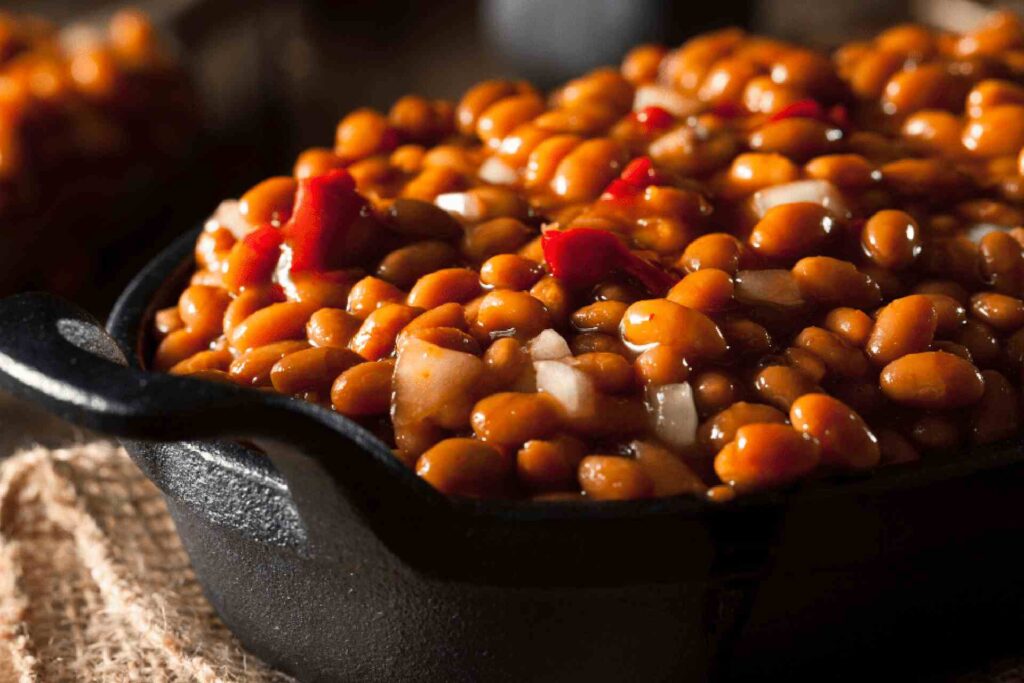
You’ve prepared a large batch of baked beans or opened a can, and you’re wondering how long do baked beans last in the fridge? You can also be considering increasing your recipe and freezing the extra for later. Can baked beans be frozen?
If one of them led you here, that’s fantastic. This is because we’ll discuss the shelf life, preservation, and spoiling of baked beans in this article.
Interested? Let’s get going into how long do baked beans last in the fridge?
Shelf life of beans in the refrigerator
You can store beans in the refrigerator for up to four days at a maximum of 8° Celsius. It is best to use a container without a lid and place the beans in the vegetable compartment.
It should be noted that the beans should get enough air. It is therefore essential to avoid airtight plastic boxes. Otherwise, the legumes will quickly become inedible.
How Long Do Baked Beans Last In The Fridge?
The remaining baked beans should be refrigerated, but if you leave them out, the USDA advises not leaving them out for more than two hours, or for 1 hour if the temp is above 90°F (32°C).
Although those suggestions are rather rigorous, you do not have to adhere to them in the letter if you don’t want to. Your baked beans should be OK to be refrigerated after 2 h and mins on the counter.
If you leave your baked beans down overnight, they must be removed, that much is certain.
Finally, a word on food safety. Make sure to use a clean spoon—not the only one you used for dinner—when transferring the remains to a storage container.
How long do canned beans last?
Canned beans offer the longest shelf life. Storage is just as easy because the pantry or a shelf in the kitchen or in the basement is absolutely sufficient.
You should only take into account that the storage area is dry and protected from light. Heat isn’t very good for cans either. You can keep the canned beans for around a year.
How can I extend the shelf life of beans?
Since green beans don’t stay fresh for long, freezing is a very good option. This allows you to extend the otherwise significantly short shelf life to up to ten months.
However, it is advisable to prepare the beans professionally for freezing. It is advantageous if you blanch the beans beforehand and then freeze them. In addition, no weight should weigh on the legumes.
How long do I have to cook green beans?
Beans don’t need to linger in hot water for long. Beans are ready to eat after about 10 minutes. They are still slightly crunchy after this cooking time but are already suitable for consumption.
If you like, you can simply let the legumes cook for about two minutes longer.
Note: The cooking time refers to water that is already hot. If you are also unsure whether the beans are ready to eat, it is better to leave them in the saucepan a little longer.
Can I Eat Green Beans Raw?
No way. Raw beans are not suitable for consumption. The human organism does not tolerate the phasing it contains very well. Side effects such as nausea, vomiting, or diarrhea can result.
Note: Be sure to keep raw beans away from small children. Consuming raw legumes can lead to severe side effects (if consumed, consult a doctor immediately).
How do I recognize fresh beans?
Fresh beans are particularly crunchy legumes. They impress with their strong green color and firm consistency. Fresh beans are difficult to bend because they break very quickly. The smell is pleasantly fresh and not particularly strong.
How do I recognize bad beans?
Bad beans eventually lose their freshness and crispness, becoming mushy and squishy. The green tint also ages and develops brown patches. Such beans are now unfit for human consumption.
Bad beans may, however, be immediately recognized visually, which is a benefit. As a result, you may immediately presume that the beans are past their prime if you notice the normal indicators.
What ingredients are in beans?
Beans contain important and valuable ingredients. Plant-based protein and dietary fiber are plentiful. In addition, vitamins B12, B6, and beta-carotene. Beans are also rich in minerals such as magnesium, calcium, and potassium.